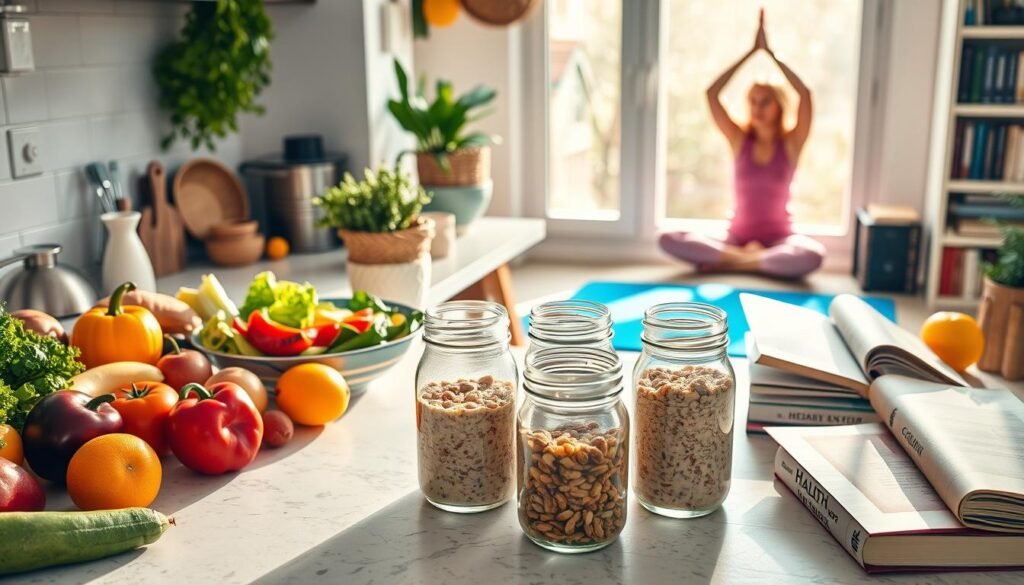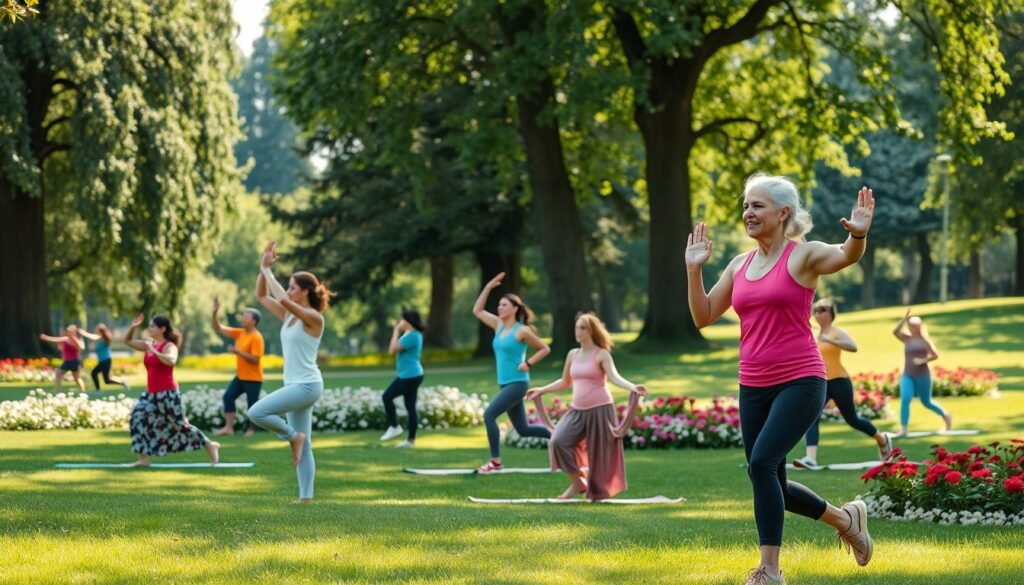
Starting a healthier lifestyle is key, and it’s important to begin now. Making small changes in our daily lives can lead to big improvements. For example, planning meals and tracking what we eat can help us eat better and save money.
Regular exercise, like walking or jogging, is also beneficial. It can lower the risk of depression, anxiety, and help with weight management.
Understanding how we change our behavior is important. It involves several stages, from thinking about it to maintaining the change. By setting small goals and tracking our progress, we can make lasting changes.
It’s vital to focus on habits that are easy to keep up all year. This way, we can enjoy a healthier lifestyle and better overall well-being.
Key Takeaways
- Adopting easy healthy habits can lead to long-term success in health journeys
- Meal planning and tracking food intake can lead to healthier eating habits and save money
- Regular physical activity can help reduce the risk of depression, anxiety, and weight management issues
- Understanding the behavioral change process is key for setting goals and tracking progress
- Focus on easy healthy habits that can be maintained all year for a healthier lifestyle
- Small changes in daily routines can lead to significant health improvements over time
- Tracking progress and adjusting habits can support long-term behavior change
Understanding the Psychology of Habit Formation
Creating simple health tips that stick requires knowing how habits form. Studies show habits make up about 40 percent of our daily actions. To make daily wellness routines last, focus on building habits that are easy to keep up. Start with small steps, like short meditation or brief exercise routines.
Improving by just one percent each day can lead to big changes over time. Breaking habits into smaller parts, like shorter meditation sessions, helps keep you going. Being consistent and patient helps turn these habits into a big part of your daily life.
Remember, missing a habit once doesn’t hurt your long-term progress. It’s key to get back on track fast, not to be perfect. By understanding habit formation and adding simple tips to your daily routine, you can make lasting changes.
| Habit Formation Strategies | Benefits |
|---|---|
| Start with small, manageable steps | Builds momentum and ease of accomplishment |
| Make one percent improvements daily | Adds up significantly over time |
| Break habits into manageable chunks | Maintains momentum and ease of accomplishment |
Easy Healthy Habits to Start Right Now That Will Last All Year
To build long-term health habits, start with small, easy steps. Begin with actions that are simple and can be kept up over time. For example, adding just five minutes of stretching each day can boost your physical health.
Try to walk 10,000 steps a day to better your blood pressure and heart rate. Also, drinking enough water is key for your body’s function. Some good healthy lifestyle tips include drinking more water, eating well, and staying active.
Here are some simple healthy habits to begin today:
- Drink at least eight glasses of water a day
- Eat five servings of fruits and vegetables daily
- Engage in 30 minutes of moderate-intensity exercise per day

By adding these effective habit-building strategies to your daily life, you can create long-term health habits that last. Start small, stay consistent, and make your habits fun and measurable.
| Habit | Benefits |
|---|---|
| Drinking more water | Improves skin health, boosts energy |
| Eating a balanced diet | Supports weight management, reduces disease risk |
| Regular physical activity | Enhances cardiovascular health, improves mood |
Morning Routines That Set You Up for Success
Starting your day right is key to feeling good all day. Drinking water or herbal tea in the morning boosts energy and sharpens your mind. Many believe that doing something fulfilling first thing sets a positive tone for the day.
Moving your body in the morning is also important. Exercise in the morning can make you feel more energetic and healthy. It can be as simple as a quick walk or a short workout. Plus, 85% of people say a morning routine has greatly improved their lives.
What you eat in the morning matters too. A healthy breakfast gives you energy and is a great habit to start. Getting enough sleep and drinking water in the morning are also important for feeling refreshed. Adding these habits to your morning can make a big difference in your day.

Simple Nutrition Changes for Lasting Impact
Developing healthy eating habits is key for our well-being. Simple changes can greatly improve our diet and lower disease risks. A balanced diet with fruits, veggies, whole grains, and lean proteins is vital for health.
Reducing sugar, staying hydrated, and eating more whole foods are good starts. Eating from a smaller plate can make us feel fuller and eat less. Cooking at home also helps, lowering obesity risk and improving diet quality, even in kids.
For lasting effects, focus on sustainable changes, not fad diets. Gradual changes help us keep healthy habits forever. Eating nuts regularly can cut death risk by 39%. Adding fiber is also a smart choice, with daily needs of 25 grams for women and 38 grams for men.

By making these simple changes, we can see lasting health benefits. It’s about making changes we can keep up with, not quick fixes.
Movement Practices That Stick
To make exercise a lasting habit, find activities that make you happy and fit into your daily life. This could be walking, running, swimming, or joining group fitness classes. Studies show that enjoying your exercise and adding it to your daily routine helps you stick with it.
Building up your exercise intensity and keeping at it involves setting achievable goals and enjoying the process. It also means not expecting too much too soon and focusing on small, specific habits. For instance, starting with walking a few times a week instead of aiming for a marathon right away can make it easier to succeed.
Here are some tips to help you stick to exercise:
- Find an exercise routine that you enjoy
- Incorporate movement into your daily activities
- Set realistic goals and focus on progressive intensity
- Find enjoyable associations with habits and habit stack

By using these tips and finding enjoyable activities, you can build lasting exercise habits. The goal is to find fun, sustainable activities, not to follow a strict routine that’s hard to keep up with.
| Exercise Habits | Benefits |
|---|---|
| Regular physical activity | Reduces the risk of disease, improves life expectancy, and boosts mood |
| Incorporating movement into daily life | Increases energy levels, improves sleep, and reduces stress and anxiety |
Sleep Optimization Strategies
Good sleep habits are key for health and happiness. To sleep better, you need to follow some tips. Keep a regular sleep schedule and make your bedroom cozy and dark.
Also, avoid screens before bed. Keep your bedroom cool, around 65°F (18.3°C). Use shades to block out light.
Don’t nap too much during the day. Try to nap for just one hour. Avoid napping late in the day to keep your sleep at night good.
Exercise is good for sleep, but not too close to bedtime. Activities like meditation can help with stress and sleep. But, remember, caffeine and nicotine can mess with your sleep.
By following these tips, you can sleep better. If you have trouble sleeping often, talk to a doctor. Many people struggle with sleep, so it’s important to address it. Experts say daily exercise is good, but not too much before bed.
Stress Management Through Daily Practices
Managing stress is key to feeling good overall. Daily habits can help a lot. By adding mindfulness to our daily life, we can handle stress better and feel mentally better. Activities like meditation, yoga, and deep breathing can lower stress and help us relax.
Here are some daily habits to help manage stress:
- Mindfulness meditation: take a few minutes each day to focus on now and calm your mind
- Deep breathing exercises: use controlled breathing to calm your body and reduce stress
- Physical activity: do regular exercise to lower stress and boost mood
By adding these habits to our daily life, we can handle stress better and feel better overall. It’s important to find what works for you and make stress management a big part of your daily routine.
Building Social Support Systems
As I work on making healthy habits easy and lasting, I’ve learned how key social support is. It keeps me motivated and feeling good. A strong support system offers emotional backing, a feeling of belonging, and the drive to keep up with healthy habits. Adults with strong connections are less likely to face health issues like depression, high blood pressure, and being overweight.
Creating a healthy support network means investing in family and friends. It also means finding people who want the same health and wellness goals. This can happen through social media groups, fitness classes, or community events. Those with strong support systems handle stress better and see it as less overwhelming. Good social ties boost happiness, while feeling lonely can lead to sadness and anxiety.
Here are some ways to build and keep up a healthy support network:
- Join a social media group or online community that shares similar health and wellness goals
- Attend fitness classes or community events
- Nurture relationships with family and friends
- Volunteer for a cause that matches your values
By focusing on building a strong support system, I can improve my overall well-being. Interacting with others releases hormones that calm us down. Face-to-face talks are better at reducing stress than texting or calling. It’s important to make an effort in relationships for our mental health. Healthy relationships require both sides to work equally hard.
Tracking and Maintaining Progress
To achieve lasting health transformation, it’s essential to focus on tracking progress and maintaining habits. This involves using various tools and strategies to monitor habits, identify areas for improvement, and make necessary adjustment strategies. Research shows that people who track their progress closely are more likely to achieve their goals.
There are many ways to track progress, including digital tools and apps, progress journaling methods, and regular assessments. Digital tools, such as mobile apps, can provide a convenient and accessible way to track habits and monitor progress. Progress journaling methods, on the other hand, offer a more personal and reflective approach to tracking habits and identifying areas for improvement.
Some common habits to track include exercise, hydration, and nutrition. By tracking these habits, individuals can identify patterns and areas for improvement, making it easier to develop effective adjustment strategies. For example, if an individual finds that they are not drinking enough water throughout the day, they can develop a strategy to increase their hydration levels, such as carrying a water bottle with them at all times.
Regular assessments are also key in maintaining habits and tracking progress. This can involve setting specific goals and deadlines, and regularly evaluating progress towards these goals. By doing so, individuals can identify areas where they need to make adjustments and develop effective adjustment strategies to get back on track.
Ultimately, the key to maintaining habits and tracking progress is to find a approach that works for each individual. By experimenting with different tools and strategies, individuals can develop a personalized approach to tracking progress and maintaining habits, setting themselves up for long-term success.
| Tool/Strategy | Description |
|---|---|
| Digital Tools | Mobile apps, online trackers, etc. |
| Progress Journaling | Reflective journaling, habit tracking, etc. |
| Regular Assessments | Goal setting, progress evaluation, etc. |
Conclusion: Your Journey to Lasting Health Transformation
Starting your journey to lasting health is a big step. It requires patience, consistency, and kindness to yourself. Think of it as a marathon, not a sprint. Success comes from making lasting lifestyle changes that improve your health.
Healthy habits are about long-term care, not quick fixes. They nourish your body, mind, and spirit. It’s a commitment for life, not just a temporary change.
Don’t forget to celebrate your small wins and be gentle with yourself. Changing your lifestyle is a journey with ups and downs. But with each step, you get closer to a healthier, happier you.
Keep moving forward, and know you can achieve your goals. Embrace the journey and stay determined. You can transform your life with patience and hard work.
Begin your journey today with the healthy habits we’ve talked about. Start by drinking more water, moving more, or making small changes to your diet. Every step you take is important.
By sticking to these habits, you’ll not just survive but thrive. You’ll enjoy the benefits of healthy living all year round.
Congratulations on taking the first step towards a healthier life. I’m excited to see where your journey will go. I’m here to support you every step of the way. Let’s do this together!